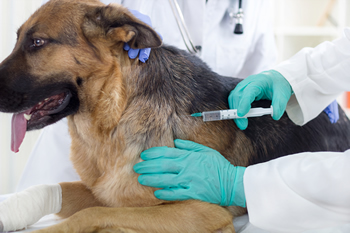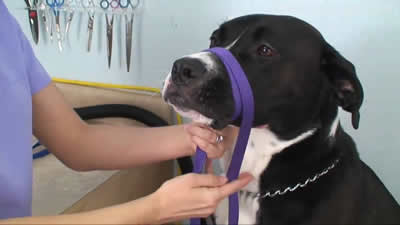At Our Wits End with Our OCD Dog!

Metronidazole Toxicity is Scary Stuff!
October 27, 2014
Vaccinating Your Dog? Learn Before You Poke!
December 2, 2014I received an email from a reader regarding their dog who’s displaying what they call some unusual behaviors and which they’ve labeled OCD (Obsessive Compulsive Disorder I’m assuming). So, let’s first look at the definition of Obsessive Compulsive Disorder in Dogs:
A quickie excerpt from this same article published in The Whole Dog Journal: “Behaviors that are usually brought on by conflict, but that are subsequently shown outside of the original context . . . Compulsive behaviors seem abnormal because they are displayed out of context and are often repetitive, exaggerated, or sustained.” So it seems dogs do suffer from OCD only in the dog world it’s called CCD or Canine Compulsive Disorder. According to the article 1 in 50 dogs suffers from CCD … WOW! That’s a lotta suffering dogs and the families they live with!
These folks may have hit the nail on the head with their CCD diagnosis, I can’t say for sure but briefly reading the article it seems like a good possibility. However, I’m not an expert and there are other things that may be going on with this dog which may include one or more of my thoughts and for me bears discussion which I’ll get into after I share with you …
What Our Reader Tells Us:
“We have a 14 month old GSD that now over time has some very unusual behaviors. It started out as what we thought was fly snapping. She would run around in circles typically when people were at our house. Over time that transferred to her now chasing her shadows on the wall all the time. She does it when it is only our family or with other people. She constantly runs around the house doing it all day long (despite spending the day at doggy day care or being exercised). Over the course of time we have tried regular training with a dog trainer at a facility and at home. We have tried meds through our vet which didn’t help. We have purchased a thundershirt which doesn’t help either.
We love her to death but we are at our wits end. She’s a sweet dog otherwise. No biting etc.
Do you have any suggestions of trainers or behaviorists in the area that could help us? Our friends are scared to come to our house for fear of what might happen. It’s not fair to us or to her.
We live in (city withheld for privacy reasons) WI.”
I don’t know if your vet has diagnosed your dog with (OCD) CCD or if this is just a phrase you feel describes her behaviors well. At any rate, in my opinion she’s probably at least a high energy dog and high energy dogs can be hard to handle by those who’s energy doesn’t match their dog. Some people may think there’s something wrong with the dog when there really isn’t, they just don’t know how to handle their dog’s energy. That’s not an editorial comment on this particular family, it’s a generalization that I’ve seen happen more than once.
I’m sorry but I don’t recommend trainers or behaviorists, however I’d like to discuss some other possibilities that come to mind that for the good of the dog and the family involved I feel needs a good look at.
I’m not understanding why your friends are afraid of her if she’s not biting? There is no reason your friends can’t come to your home if you use of a crate or put her in a room away from the activity for the duration of their visit. This is not ideal, I myself would prefer the dog be out but if we have company other than just a few key people who can follow the rules — our dogs are crated. We can’t possibly watch everyone, the dogs, all activities and interactions every second and we won’t take the chance of something going wrong because someone doesn’t know how to behave around dogs.
Have You Thoroughly Vetted Her?
Have you taken her to the vet for a thorough check up and blood workup including checking her eyes, hearing and testing her thyroid levels? Sight or hearing disabilities are not always obvious. I know of a dog who’d seen numerous vets and not a single one picked up on the fact the dog was nearly blind. Being sight challenged can cause behavior issues if it goes unchecked and no one helps the dog with their special needs so they can settle down and live comfortably. If your vet hasn’t literally diagnosed your dog with CCD it would be a sad disservice to her and to your family to assume this is what’s going on. My feeling is you need a proper diagnosis in order to proceed in the best way possible. Whatever is going on is serious stuff that will likely have a significant bearing on where you (and your dog!) go from here and I personally would get a second and probably even a third opinion. A misdiagnosis could mean a lifetime of misery for your dog. You say you want to be fair and I’m happy to hear that, but to be fair my feeling is you need to do everything you possibly can to make fair happen. I’m one of those who will leave no rock unturned.
No different than people medicine, veterinary medicine is sometimes at best a guessing game. Some vets will just opt to start dispensing pills for things that aren’t completely known in the hopes it will help. If one drug doesn’t help, maybe another will … which can become a vicious circle. That’s certainly not ideal but it’s not a criticism either, it’s just unfortunately the way it is with the sometimes hit & miss game of diagnostics. As you’ll read further down, sometimes popping pills into a dog doesn’t always get the desired results.
What Are You Feeding Her?
Take a good look at what you’re feeding her. I’m going to assume it’s some brand of commercial dog food. There are bazillions of dogs out there allergic to one or more ingredients in manufactured foods not to mention what the toxins in it can do to a dog. Allergies aren’t just about itchy skin or watery eyes. An allergy to one or more dog food ingredients can do a lot to mess up a dog. Although our preference is a raw diet the majority of people unfortunately still haven’t accepted this so if nothing else, I would switch her to a no-grain formula if she’s not already on no-grain.
Before you decide what to switch to, please first have a look at this Grade Your Dog Food page. I would also suggest that you click over the the Dog Food Advisor and do some research there. Food allergies can cause bizarre behaviors so I wouldn’t rule it out.
Could She Simply be a Working Line Girl?
She reminds me of a dog we recently fostered who was simply way too much dog for our house. The reason for this is that she’s a working line GSD and a working-line dog is a whole ‘nudder ball game when compared to your average house pet dog. Not that a working line dog can’t be a pet, they can and many are but they need the right family to be successful is my opinion. Her energy level was sky high, even petting her got her riled up. If I took her on a bike ride she was more raring to go after the ride than she was before. Her being in our house caused excessive stress on our couch-potato dogs. She paced at the door to go out and do something and if I let her out she dug holes in our yard and grabbed divots of grass to run around shaking like she wanted to kill the divots. I was guilty of not being able to meet this little girls needs and so she acted out. Everything was a game to her and she was often non-stop nervous anxious motion. Our own dogs were so stressed that I was cleaning up stress-related vomit and diarrhea often, they just could not handle her energy level.
We tried herbal homeopathic and prescription calming meds from our vet but only because this little girl also suffered from a horrendous case of separation anxiety and we were hoping to calm her down enough to help get her past her SA. Unfortunately, she was unaffected by the herbal calming remedies and she then had a bad reaction to the prescription meds about a week into it and was becoming even more anxious and even began becoming aggressive with me.
I have limited contact with working line GSD’s but enough to know I could never have one, they are simply too much dog for us and I know without a doubt we could not meet their needs. Had I been able to confirm her background before we brought her into our home, as much as we want to help a dog in need I would have had to decline fostering her because I know better. You may find a good trainer in your area for the average dog but if your dog is working line my thought is that you need a working line trainer experienced in activities that are working line dog activities such as Schutzhund as just one example.
You might say “But all German Shepherds are working dogs!” and you’d be right … but only to a point. A working line Shep is like a Shep on steroids and if that’s what she is I can see why you’d label her CCD. These dogs can and given the opportunity will go go go all day long, it seems there’a no end to their energy. The more you give them to do the more they want to do. They need a strong handler who’s way more alpha than your average family member and an all around living environment that’s suited to their inherited genes and where these needs will be met.
Although your dog is not quite a year and a half old, working line dogs do not grow out of this behavior after they hit the age of about two and a half which is when your average dog will start to settle down because they’ve left puppy-hood and their teen years behind them and are now adults. If you’re thinking you can try to train this behavior out of a dog … think again … “You can’t change the spots on a leopard.” If she’s working line and she’s not getting her physical and mental needs met it could account for some of her bizarre behaviors.
German Shepherds are known to be what’s called “mouthy” meaning they like to gnaw on you and although it can be painful, they’re not biting. In a working line dog this behavior is often what the average person may call exaggerated or even refer to it as biting but it’s totally normal. I’m told you can work with it to try to tame it but I’m not convinced.
Can You Confirm Her Gene Pool?
If you have a way to confirm whether she’s working line or not I feel this is very important to know before you make any decisions as to where you and she goes from here. You didn’t mention if you’d rescued, adopted or purchased her from a breeder. If you have papers read them, there should be something that tells you if she’s working line. If you can’t make this out from the papers check the breeder’s website where you should then be able to determine what types of dogs they breed and sell. If you still aren’t sure, call the breeder. I would have no kind words for a breeder who knowingly sold an average family a working line dog, that would just be absolutely wrong. A reputable breeder would not do this because they know it would never work.
I suspect you may be dealing with just such a dog. For her sake and your peace of mind, if you can please try to determine for sure she’s working line or not. Don’t just assume this just because I said she may be. If you can, contact a reputable working line breeder. You might also contact Leerburg which may or may not be close enough for you and see if you can get her evaluated by one or the other or both for confirmation. I tend to think a working line breeder and/or the folks at Leerbug would be able to determine this in a heartbeat. You could also try a local Schutzhund club for an eval. People who deal with working line dogs every day may also be able to make some suggestions or recommendations for you.
And If None of the Above Works?
We’re first and foremost believers in doing whatever is necessary to work through a dog issue and believe me — we’ve worked through some doozies! But sometimes the best solution does not lie within us and we have to put the good of the dog ahead of what we believe. If you find you must rehome your dog a shelter is not the place to accomplish this. First of all, dogs in general don’t do well in shelters but GSD’s handle it even worse than other breeds and can develop behavior problems and serious medical conditions very quickly. Shelters have so many pets to find homes for and most do not have “breed specific experts” who will hold out until just the right home comes along. Shelters are constantly pushed to make room for the next and the next and the next.
If the breeders and other Shep expert people mentioned can’t help you find a solution please contact a reputable Shep rescue instead, don’t opt for an all-breed rescue. Without the right home your dog could wind up being passed around like a box of popcorn at the movies … developing more and more behavior problems as time passes which will then likely eventually get her euthanized because no one will a) take the time to and/or b) be able to help her.
We hope this helps you find a workable solution and of course wish you and your dog the very best outcome. Please let us know what happens.



1 Comment
Watch “It’s Me or the Dog” with Victoria Stillwell. She deals with a few cases like this. I’m sorry, but it takes more than thurough vetting and recognizing working behaviors.